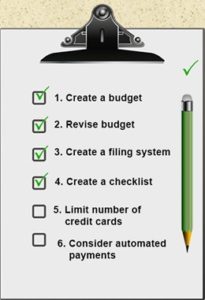National nonprofit American Consumer Credit Counseling shares important tips on achieving a healthy financial lifestyle during National Get Organized Month.
Boston, MA – January 25, 2017

Get Organized Month is a month-long campaign created by the National Association of Professional Organizers (NAPO) in 2005 to promote the benefits of organization, and to encourage individuals to regain control of their possessions, surroundings and time. NAPO hosts events across the country to promote organization in communities.
“Living a healthy financial life starts with good organization and a solid budget,” said Steve Trumble, President and CEO of American Consumer Credit Counseling, which is based in Newton, MA. “It is important that consumers keep track of their expenses, bills and accounts so they don’t end up with crippling late and overdraft fees or excessive debt.”
According to the 7th Annual Billing Household Survey from Fiserv, 36 percent of consumers paid a bill after it was due in 2015. Eighty-three percent of consumers admitted that receiving and paying bills takes an extreme amount of effort.
American Consumer Credit Counseling offers consumers tips on how to organize their finances:
- Create a budget – a budget is the foundation of financial planning. It shows consumers exactly how much money they have and where it is being spent. A budget also has the ability to help consumers find ways to save money. A budgeting worksheet can help customize their spending plan.
- Revise budget – Bills can often change month to month, so it is important that consumers revisit their budget once a month and revise it if necessary to ensure it is up to date.
- Create a filing system – It is important to have a place for bills whether they get filed electronically or placed in folders somewhere that is easy to find. Create a folder for each type of bill such as medical, insurance or credit card.
- Create a checklist – Creating a checklist that shows every bill a consumer is expecting each month allows them to keep track of bills paid and bills they are still expecting to receive. If they are able, it is best for consumers to try to pay their bills when they are received.
- Limit number of credit cards – Having several credit cards can often lead to overspending. Consumers should try to limit themselves to one or two cards. It is important that these cards are paid off each month.
- Consider automated payments – Automated payments insure that a bill is never late. However, consumers need to be careful and keep enough money in their account to avoid overdraft fees due to automatic payment dispersing.
ACCC is a 501(c)3 organization that provides free credit counseling, bankruptcy counseling, and housing counseling to consumers nationwide in need of financial literacy education and money management. For more information, contact ACCC:
- For credit counseling, call 800-769-3571
- For bankruptcy counseling, call 866-826-6924
- For housing counseling, call 866-826-7180
- Or visit us online at ConsumerCredit.com
About American Consumer Credit Counseling
American Consumer Credit Counseling (ACCC) is a nonprofit credit counseling 501(c)(3) organization dedicated to empowering consumers to achieve financial management through credit counseling, debt management, bankruptcy counseling, housing counseling, student loan counseling and financial education concerning debt solutions. In order to help consumers reach their goal of debt relief, ACCC provides a range of free consumer personal finance resources on a variety of topics including budgeting, credit and debt management, student loan assistance, youth and money, homeownership, identity theft, senior living and retirement. Consumers can use ACCC’s worksheets, videos, calculators, and blog articles to make the best possible decisions regarding their financial future. ACCC holds an A+ rating with the Better Business Bureau and is a member of the National Foundation for Credit Counseling® (NFCC®). For more information or to access free financial education resources, log on to ConsumerCredit.com or visit https://www.consumercredit.com/debt-resources-tools/
